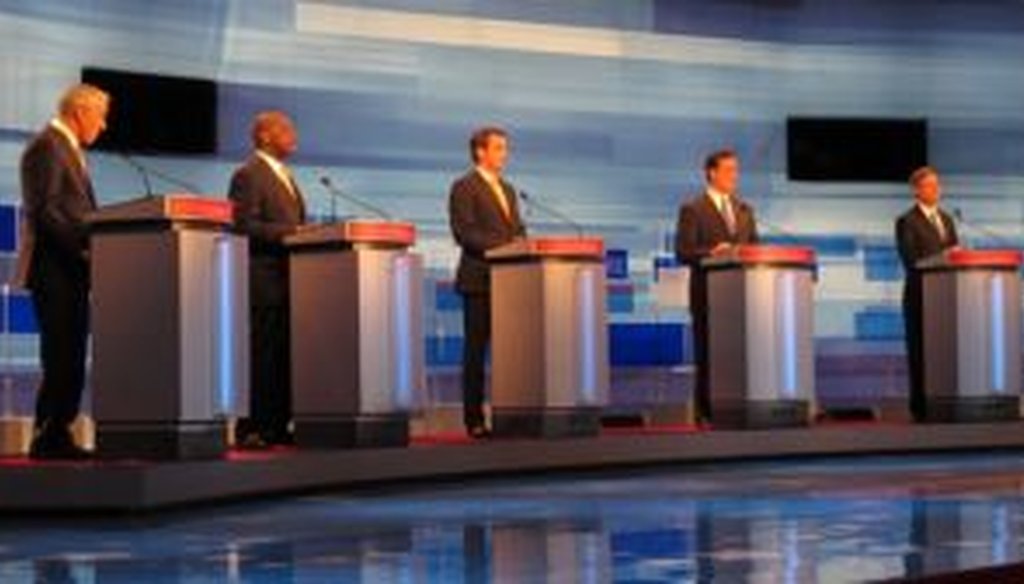Stand up for the facts!
Our only agenda is to publish the truth so you can be an informed participant in democracy.
We need your help.
I would like to contribute

Five Republican presidential candidates met for a debate on May 5, 2011, in Greenville, S.C.
Gary Johnson says U.S. has "the highest corporate income tax in the world right now”
If there’s one issue that binds Republicans, it’s a preference for low taxes. So it’s no surprise that in the first debate of the 2012 presidential campaign -- held May 5, 2011, in Greenville, S.C. -- the topic came up.
At one point, Fox News commentator Juan Williams asked Gary Johnson -- the former Republican governor of New Mexico and a strong libertarian -- about corporate taxation.
"Gov. Johnson," Williams said, "the nation's unemployment rate is 8.8 percent and this week, jobless claims rose to their highest level in eight months. Among your proposals for getting the private sector to start hiring are eliminating corporate income tax, doing away with the federal minimum wage law and to stop extending unemployment benefits. Isn't that just a windfall for big business?"
Johnson responded, "Well, absolutely not. I think that repealing, or doing away with the corporate income tax is simply getting us back to where we were. And we need to understand that the corporate income tax is a double tax -- that we all own the corporations, and when income gets distributed to us, we pay the tax on that. So, we have the highest corporate income tax in the world right now. Let's abolish it."
We have looked at the question of whether the United States has "the highest corporate income tax in the world" in previous items, so we thought we’d revisit it now.
There are two primary ways to compare corporate tax burdens. One is to compare statutory corporate tax rate -- the rate that’s actually on the books.
The Organization for Economic Cooperation and Development, a group of more than two-dozen large, industrialized democracies, publishes the rates of its member countries. The most recent data shows Japan on top at 39.54 percent, vs. 39.21 percent for the United States. Japan had been scheduled to cut its corporate tax rate to a level below the United States, but the earthquake, tsunami and nuclear disaster that crippled portions of the country earlier this year has left that in doubt.
The other way to look at it is to gauge what firms actually pay, once exclusions and other adjustments are taken into account. This is called the "effective" tax rate.
The World Bank has assembled data from 183 nations and made a series of statistical adjustments to produce a full international comparison of effective tax rates. By this measurement, the U.S. rate is considerably lower than the published rate -- 27.6 percent. But in a comparative sense, that's still pretty high: Among larger international economies, only Japan, New Zealand and Thailand imposed a higher effective rate, according to the World Bank study.
The World Bank also produces another -- and broader -- statistic. It factors in not only the corporate profit tax but also a range of other taxes paid by businesses, including the cost of employee taxes borne by the employer. When the World Bank ranked countries from the lowest level of taxes to the highest, the U.S. ranked 124th out of 183 -- meaning corporate taxes were relatively high. A number of other large and/or democratic countries were higher, including Austria, Belgium, Brazil, China, France, Hungary, India, Italy, Spain and Sweden.
This last measure provides a wider snapshot of U.S. tax policy toward businesses, but it also introduces some complications. Factoring in the employer-paid portion of labor taxes makes the corporate tax rate seem higher in countries that provide higher benefits such as pensions or health care through business taxes, while making the rate seem lower for countries that provide less generous benefits through the tax code. So making apples-to-apples comparisons can be tricky.
There's also broader context that Johnson doesn't get into. In a previous item, we noted that when all taxes, including those such as personal income taxes and property taxes -- not just corporate taxes -- are taken into account and compared to gross domestic product, the U.S. doesn't rank near the top of the OECD table in total tax burden.
Still, Johnson’s claim was more limited, addressing only corporate taxation.
To be more accurate, Johnson should have said the United States has the highest "corporate tax rate" rather than the highest "corporate taxes." By using the term "corporate taxes," Johnson opens the door to the broader World Bank figure, which would put a number of other major countries above the U.S. in the rankings.
That way of looking at it would undercut Johnson’s argument. On the other hand, he is close to correct when using the two more common benchmarks -- statutory tax rates (in which the U.S. trails only Japan, for now) and effective rates (where the U.S. trails only Japan, New Zealand and Thailand). On balance, we rate Johnson’s statement Mostly True.
Featured Fact-check
Our Sources
Gary Johnson, comments during Republican presidential debate in Greenville, S.C., May 5, 2011 (via Congressional Quarterly -- subscribers only)
Organization for Economic Cooperation and Development, "Basic (non-targeted) corporate income tax rates" (Table II.1), accessed May 6, 2010
World Bank, "Paying Taxes 2011: The global picture," Nov. 18, 2010
PolitiFact, "Barack Obama in State of the Union says U.S. corporate tax rate is among world's highest," Jan. 25, 2011
PolitiFact, "Pat Toomey says U.S. has highest corporate tax rates in the world," Jan. 3, 2011
PolitiFact, "Sen. Marco Rubio says the United States will soon have the industrialized world’s highest corporate taxes," April 4, 2011
PolitiFact, "Tim Pawlenty says the U.S. is not undertaxed compared to its competitors," July 29, 2010
Bloomberg, "Japan Weighs Scrapping Corporate Tax Cut, Increasing Levies on Households," Mar. 29, 2011
Browse the Truth-O-Meter
More by Louis Jacobson
Gary Johnson says U.S. has "the highest corporate income tax in the world right now”
Support independent fact-checking.
Become a member!
In a world of wild talk and fake news, help us stand up for the facts.






















































